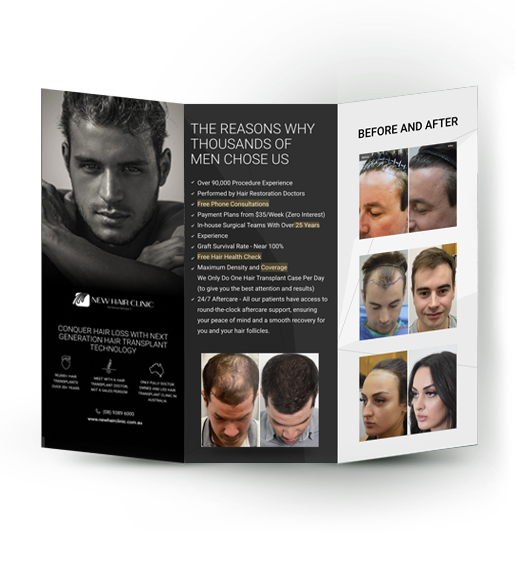90,000+ HAIR TRANSPLANTS
OVER 30+ YEARS
MEET WITH A HAIR TRANSPLANT
DOCTOR, NOT A SALES PERSON!
ONLY FULLY DOCTOR OWNED AND LED HAIR TRANSPLANT CLINIC IN AUSTRALIA
What Is Alopecia Areata?
Alopecia areata is a medical condition that affects women and men, where hair loss develops in patches — generally on the head. On occasion, total baldness may occur. In most cases the hair will grow back after several months, but in some cases, mens hair loss can be permanent.
It is not known exactly why alopecia areata occurs, but it is believed that the immune system attacks the cells which produce hair, causing inflammation at the root level.
What Is Involved In The Alopecia
Areata Injection Procedure?
The procedure entails cortisone injections into the scalp approximately 1 cm apart. The number of injections depends on the size of the area being treated and can range from 2 -3 injections in smaller areas to 40 – 50 injections in larger areas.
To reduce the level of pain and discomfort, we generally apply a numbing cream prior to the treatment. After the procedure, patients can resume most activities immediately.
Wondering if Alopecia Areata Treatment
is Right For You? Find Out Today
How It Works
Steroid injections aim to first supress the immune system that occurs in alopecia areata. This prevents them from attacking hair follicles so they can function normally and trigger hair regrowth. These injections are repeated about every four to six weeks and tend to work best in those who have small patches of hair loss. It may be necessary to repeat this treatment every few months.
In a study of 84 patients, 92 percent of participants with patchy alopecia areata and 61 percent of participants with alopecia totalis (total baldness) experienced regrowth on treated areas.
When performed properly with the right concentration and amount, injection treatments are very safe. Our hair loss specialist, Dr Muchi can use steroid injections to stop or reduce inflammation under the scalp in many hair loss conditions.
Who Are The Best Candidates?
- Women and men with alopecia areata
- Patients with small patches of hair loss
- Hair loss affecting less than 50% of the scalp
During the initial complimentary consultation, our Doctor or one of our nurses will perform a thorough assessment. If cortisone injection is not the appropriate treatment for your specific type of hair loss, we may recommend another treatment, such as PRP injections or mesotherapy.
Frequently Asked Questions
When Will I See Results?
Because cortisone takes time to reduce inflammation at the root level of the hair, new hair growth is typically seen in approximately 4-6 weeks.
How Many Treatments Will I Need?
Injections are repeated at 4-6 week intervals until the hair has grown back. Unfortunately, cortisone injection treatments do not prevent new hair loss from developing.
What Are The Benefits Of Cortisone Injections For Alopecia?
- Minimally invasive and non-surgical procedure
- Highly effective on alopecia areata
- Minimal discomfort and minor pain
- Great alternative to surgical transplants
- Cortisone injections provide quick relief from the symptoms of alopecia areata, such as patchy hair loss, itching, and burning.
- Boosts immune system’s defensive capabilities
- Results usually visible from four weeks
- Cortisone injections are generally considered safe and have few side effects.
Why Choose Steroid Injections?
This treatment is appropriate for individuals who have been diagnosed with alopecia, so can treat various hair loss conditions such as alopecia areata and some types of traction. It most suitable for patchy, relatively stable hair loss, of limited extent.
How Many Treatments Are Required?
Treatment is given every 4 weeks, for up to 6 months.
Some patients only require one or two treatments, while others need the full 6 treatments. The average number of treatments is 3 to 4. Treatment is not extended beyond 6 treatments if there have been no results.
When Should Steroid Injections Be Performed?
It is believed that steroid injections are likely to be most beneficial within the first month of developing a patch of alopecia areata. It may also be that by controlling inflammation early on, the immune system is quietened down and may not cause patches of hair loss elsewhere in the scalp though this has not been conclusively proven. Steroid injection can however be given at any stage, as recommended by your doctor, even one or two years after a patch has been present.
How Much Do Alopecia Treatments Cost?
The cost of Steroid Injections starts from $250 per vial.
Ask Us a Question
Got a question? Want to book a consultation? You’re in the right place. Fill out the form and one of our specialists will be in touch soon. Prefer a phone call? Perfect, give us a call on (08) 9389 6000.


